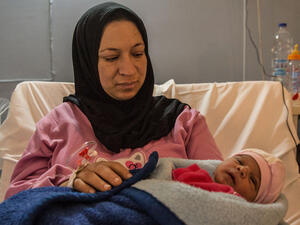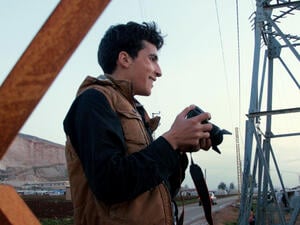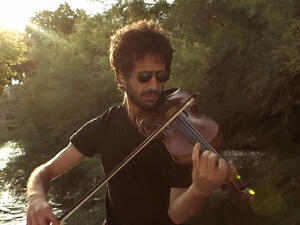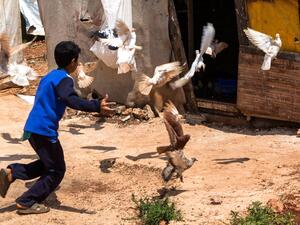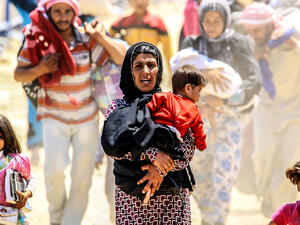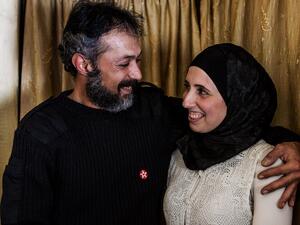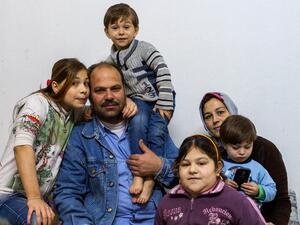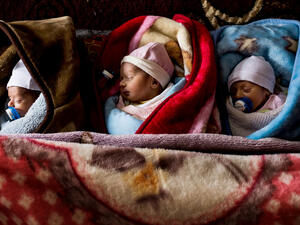Syrian villagers open their doors to mass arrival of Lebanese refugees
Syrian villagers open their doors to mass arrival of Lebanese refugees

Displaced Lebanese gather water from a truck which supplies the Syrian village of Sal Heiye. The villagers have welcomed their unexpected guests and are sharing resources with them.
SAL HEIYE, Syria, August 8 (UNHCR) - A month ago this village in the poor rural land south of the Syrian capital Damascus had 1,500 residents. Now the population has passed 2,000 and another 50 Lebanese fleeing the war in their homeland arrive every day.
The response of Syrian citizens in the villages has been the same as in the relatively wealthy capital: they have been overwhelmingly generous in opening their homes, mosques, convents, community centres and public schools to the thousands of Lebanese refugees.
But they are feeling the impact. From the very beginning of the conflict, Syrian authorities were directing desperate Lebanese toward villages that could host them. The citizens of Sal Heiye, for example, saw their village grow within three weeks by a third.
Sheikh Suher, the imam of the area and a counsellor for all citizens in need, initially opened his mosque and made provisions to use five schools in the district as temporary shelters. In addition, host families volunteered to take guests.
Then the community realised they had an old shoe factory, which was awaiting demolition but could be used. All new arrivals, which the imam says now number some 50 a day, are sheltered there.
Asked if the village might have reached or even surpassed its assistance capacity, Sheikh Suher says: "Well, what shall we do? If they keep on coming we'll put all of them in our homes."
But he admits space for new refugees is getting scarce. Though they are proud of managing the situation so well and there is anger at the delay in action by the UN Security Council to halt the war, residents admit that major assistance from the United Nations would be appreciated.
UNHCR, through the Syrian Arab Red Crescent, has started distributing relief items like kitchen sets, mattresses and blankets and is currently purchasing other needed items like underwear for adults and children, pillows, diapers and sanitary napkins. The sheikh is preparing a list of further needs that he hopes UNHCR can fulfil.
The villagers have volunteered to cook for the Lebanese refugees, with citizens coming to the shelter each day to distribute food. Charities donated clothes and canned food. The village is reacting spontaneously, with no formal system of coordination.
"Some people come and bring whatever they can afford. Others ask us first what we need," says the sheikh. But a major problem for the community is drinking water. "We don't drink our tap water here. We are supplied by water trucks and of course we share the water we get with the refugees."
Sheikh Suher assures the Lebanese that they will continue to be given refuge. "Everybody is welcomed here. We let them stay as long as they need. I don't care whether we have Muslims, Christians.... I treat them all equally. Why can't the world just live together in peace?"
But the strain on the village is starting to show. "We can continue to help them for maybe one week," the sheikh says. Then he will need more food and hygiene articles for babies and women as well as mattresses, blankets and pillows.
The Lebanese are overwhelmed by the hospitality, which gives some relief to their daily grief. But they are getting increasingly anxious about the destruction of their country. Some play cards; others prefer to watch the local news, only to get more upset when they see Lebanon being bombed again.
"We want to go home, but we don't know how long we still have to stay here. This situation is becoming unbearable," Ahmed, a young man who fled the Baalbek area some two weeks ago, says angrily. He and his friends say they have considered returning without waiting for a ceasefire but their relatives have held them back.
Syrian hospitality to the Lebanese has eased their plight. But with more refugees arriving every day and growing despair among the Lebanese, Ahmed and his friends reflect a growing anger among the Lebanese refugees over the failure of the international community to halt the fighting.
By Annette Rehrl in Sal Heiye, Syria

